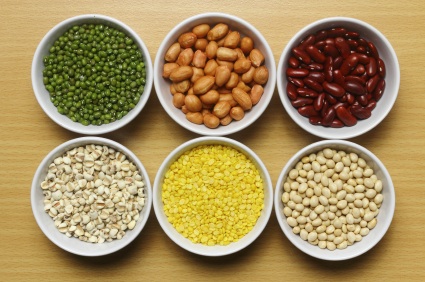This post is a response to a question I received on my facebook page. If you have a question feel free to stop by and ask!
When I was a vegan I got this question all the time: "So like, how do you get enough protein?" Let's take a closer look at protein, and how to make sure you are getting enough!
What is a "protein"?
A protein is comprised of 20 different amino acids. 11 of those our bodies can make, leaving the other 9 up to us to get through a proper diet. So technically, you don't need protein. You need the 9 Essential Amino Acids to build protein. With that being said, why is there so much emphasis in the media about getting enough protein?
Because the Factory Farm Business is a giant Cash Cow that wants you to believe that you need their products to live.
Seriously. That's why. These corporations run massive campaigns to make you believe that if you don't drink milk you will be fat, or that if you don't eat eggs or meat then you will shrivel up and die from a protein deficiency. This simply isn't true.
Animal Protein vs. Plant Protein
 Animal products are considered a "complete" protein, meaning that they have all 9 essential amino acids required to build muscle and perform other bodily tasks. What's interesting, is that these animals get their amino acids from the plants that they eat. So if you are a vegan or vegetarian, you can skip the middle man and just eat the plants. There has been a common acceptance of a theory called "protein combining" in which you have to eat certain foods together to get all 9 essential amino acids. This has been disproven by the original author. If your vegan or vegetarian diet is calorically sufficient with a wide variety of grains, beans and vegetables, then you are in no risk of becoming "amino acid deficient". Which means no risk of becoming protein deficient.
Animal products are considered a "complete" protein, meaning that they have all 9 essential amino acids required to build muscle and perform other bodily tasks. What's interesting, is that these animals get their amino acids from the plants that they eat. So if you are a vegan or vegetarian, you can skip the middle man and just eat the plants. There has been a common acceptance of a theory called "protein combining" in which you have to eat certain foods together to get all 9 essential amino acids. This has been disproven by the original author. If your vegan or vegetarian diet is calorically sufficient with a wide variety of grains, beans and vegetables, then you are in no risk of becoming "amino acid deficient". Which means no risk of becoming protein deficient.Side Note: Animal products tend to be absorbed easier by the body because they do not contain fiber, whereas it takes a little more work to break down plant-based proteins. This is where I ran into issues with a vegan diet. I have an extremely damaged gut, and so my body isn't as efficient at breaking down and absorbing nutrients as the average person. If you have an easily upset digestive system, then be very mindful when considering a completely vegan diet.
Surprisingly High Amounts of Protein can Be Found in Vegetables
Did you know that 1 cup of broccoli has 2 grams of protein? 1 Medium potato has 4 grams of protein. Other high protein vegetables include kale, cabbage, zucchini, and mushrooms. And these are just vegetables. That's not even including nuts, beans and seeds!
So how much protein do you really need?
This has been debated upon for years. But the amount is surprisingly low. If you look at the USDA recommended amount of protein for a woman aged 19-33, it's a 5 1/2 ounce equivalent. 5 1/2 ounces of chicken breast (a little bigger than your palm) equals about 34g per day of protein. That's really not a lot. Take this vegan meal for an example:
1/2 Cup cooked wild rice blend (7 grams of protein)
1 Cup of steamed broccoli (2 grams of protein)
1/2 cup of Chickpeas (6 grams of protein)
This provides almost half of the USDA recommendation for only 321 calories. The average person consumes anywhere from 1,700-2,000 calories per day. You could double this meal for a reasonable lunch, and have almost all of your protein met for the day. It's really time to drop the theory that you need large amounts of protein.
What you should focus on instead,
Is the variety and quality in your diet. If you choose to eat animal products, make sure you are buying the highest quality meat, eggs and dairy, to ensure that you are getting all the amino acids that healthy animals can provide. This can seem really expensive, but if you shift your thinking away from the protein-saturated media, then you will realize that you really don't need very much of it. When you do this, you will be spending more, but because you are consuming less it will all even out.
Vegans and Vegetarians,
If you are eating lots of fresh, nutrient dense foods such as vegetables, nuts, grains, beans, fruits and seeds, you are in no danger of protein or amino acid deficiency. However, things like grains and beans can take a while to make, so it's easy to skip them in favor of
In Conclusion
Like most things, quality trumps quantity. It's what you do in the long-term that affects your health the most. So if you are being sure to consume lots of vegetables, high quality animal products or beans and grains, then your body will have everything it needs to function properly.
Well wishes,
-Amara



No comments:
Post a Comment